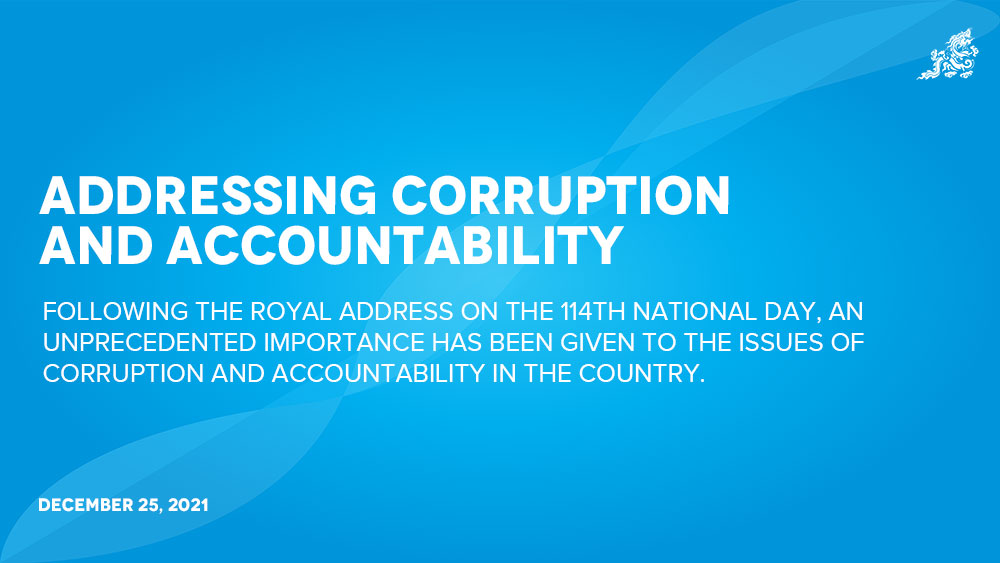MB Subba
Following the Royal address on the 114th National Day, an unprecedented importance has been given to the issues of corruption and accountability in the country.
The government has pledged to leave no stone unturned to correct the shortcomings in the system. However, observers say that an overhaul of the system is required for the government to live up to the commitments.
Lack of a right to information (RTI) Act and a proper system for holding officials at the executive level accountable have been a major impediment to addressing the issues.
The annual audit report 2020-21 states that agencies and authorities have failed to take corrective actions. It adds that those at leadership positions lack the temperament to strengthen internal control measures in agencies.
The independence and autonomy of agencies like Royal Civil Service Commission (RCSC) and local governments, and their tendencies to work in isolation, according to observers, also poses a challenge to address the issue of corruption and accountability.
An official explained that it was often difficult for the government to bring independent institutions and corporations like the Druk Holding and Investments (DHI) on board as they tend to stick to their own rules.
He also cited “name dropping” culture and “connections”, which is colloquially referred to as “thuenlam” in the Bhutanese society as one of the major challenges.
According to him, one of areas where a proper accountability system needs to be put in place is the judiciary. Such a measure, he said, would strengthen people’s trust in the judiciary.
Others highlighted systemic flaws in the RCSC system and the alleged prevalence of “favouritism and nepotism” in recruitment and selection of civil servants.
Citing an example, a former National Council (NC) member, Tharchen, said that those placed in positions to fix accountability are sometimes junior to the ones on whom accountability is to be fixed in the position classification system (PCS).
Another issue was the tendency of elected executives and politicians to warm up to voters.
A Member of Parliament said that the elected executive and members of legislative bodies should look beyond electability and be able to take independent decisions and amend laws if need be. “Voters frequently bully and blackmail their elected representatives.”
Citing an example, he said that the Local Government (LG) Act needed to be amended to put in place a proper system to improve transparency and accountability in local governance.
Sector wise, the recent annual reports of the Anti-Corruption Commission (ACC) have shown that corruption complaints against local governments are among the highest.
However, some local leaders Kuensel talked to blamed inconsistencies between the LG Act and the rules and regulations for a significant portion of the corruption allegations.
One of the gups-elect in Trashigang said that the clarity of the local government’s roles and responsibilities should be enhanced. “There should be transparency in the system,” he said.
Many observers believe that having an RTI Act could help address the corruption and accountability issues. The second government had introduced an RTI Bill in Parliament, but it was not passed.
The Chairman of the Public Accounts Committee (PAC), Ugyen Tshering, said that the main responsibility of enforcing accountability issues lies on the government as the central executive body. He said that the heads of agencies and corporations should also play proactive roles in addressing the issues.
He said that many issues could not be addressed, as they were subjudice. “Some cases took a long time to settle as the defendants exhausted all the appeal process,” he said.
Parliament recently recommended a designated bench to expedite the resolution of corruption cases.
In the State of the Nation statements in the joint sitting yesterday, Prime Minister Dr Lotay Tshering said that the Royal address on the National Day reflected a “true state of the nation”.
One of the main concerns highlighted by His Majesty in the address was corruption and lack of accountability. The prime minister said that he would take accountability should he fail.
Opposition Leader Dorji said that the Royal address was a “historic address, deeply inspiring with a clear vision, direction, and of course, uncompromising way forward”.
“On our part, the Opposition will fully commit to do everything possible in our capacity to perform our sacrosanct role in nation building,” he said, adding that each Bhutanese must take this rare opportunity to give his best.
Dorji Wangdi said that the Royal address underscored the strong aspirations and determination of Bhutan to keep pace with the best in the world and leapfrog Bhutan to an economically prosperous nation.
“On the downside, it meant that we have a huge gap between our current governance system and national aspirations, and as such, a colossal task ahead of us to bridge the gap,” he said.
After the Prime Minister’s statement, the Speaker yesterday opened the floor of the joint sitting for members to express their views on the royal address, but members did not take the opportunity.


